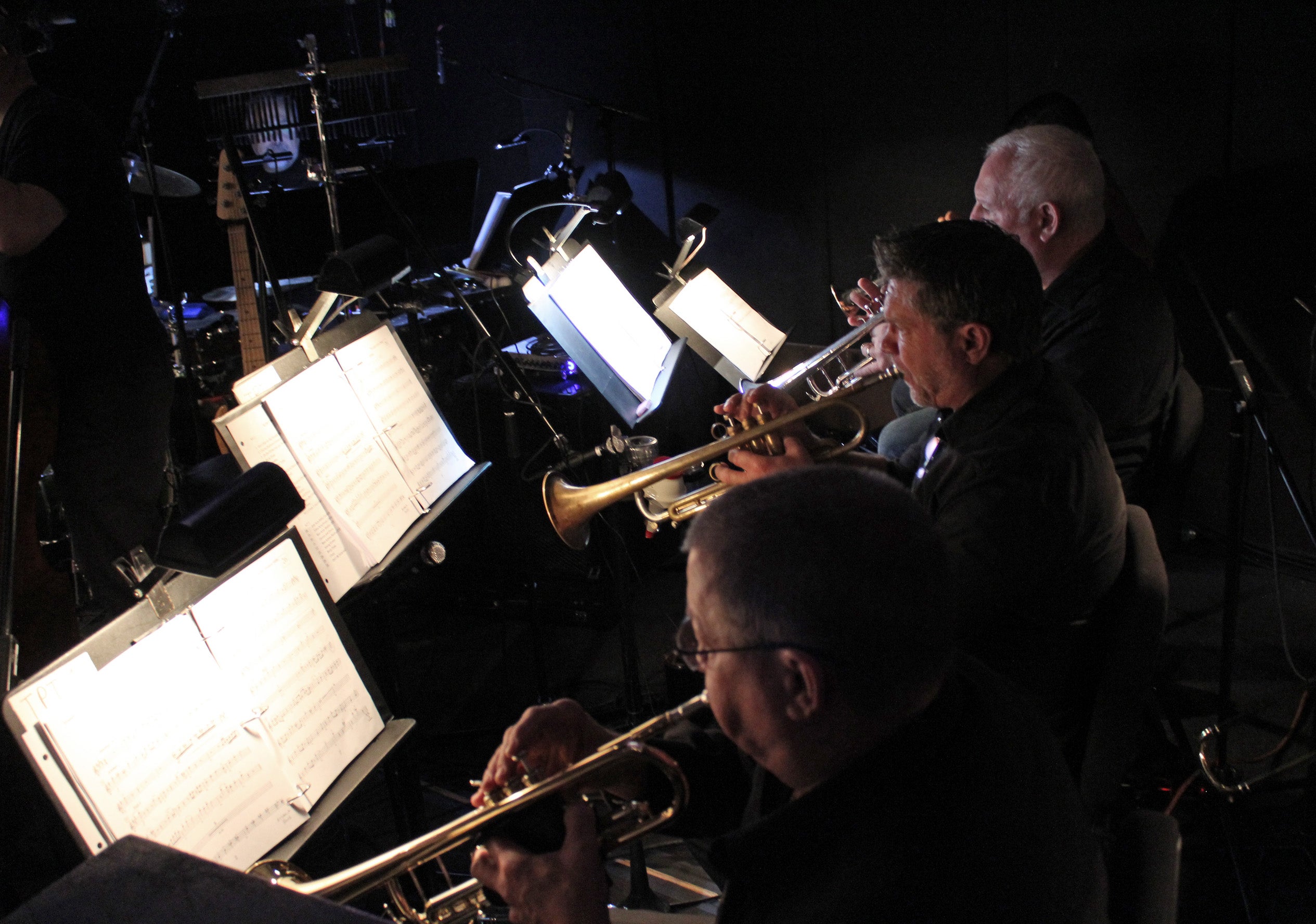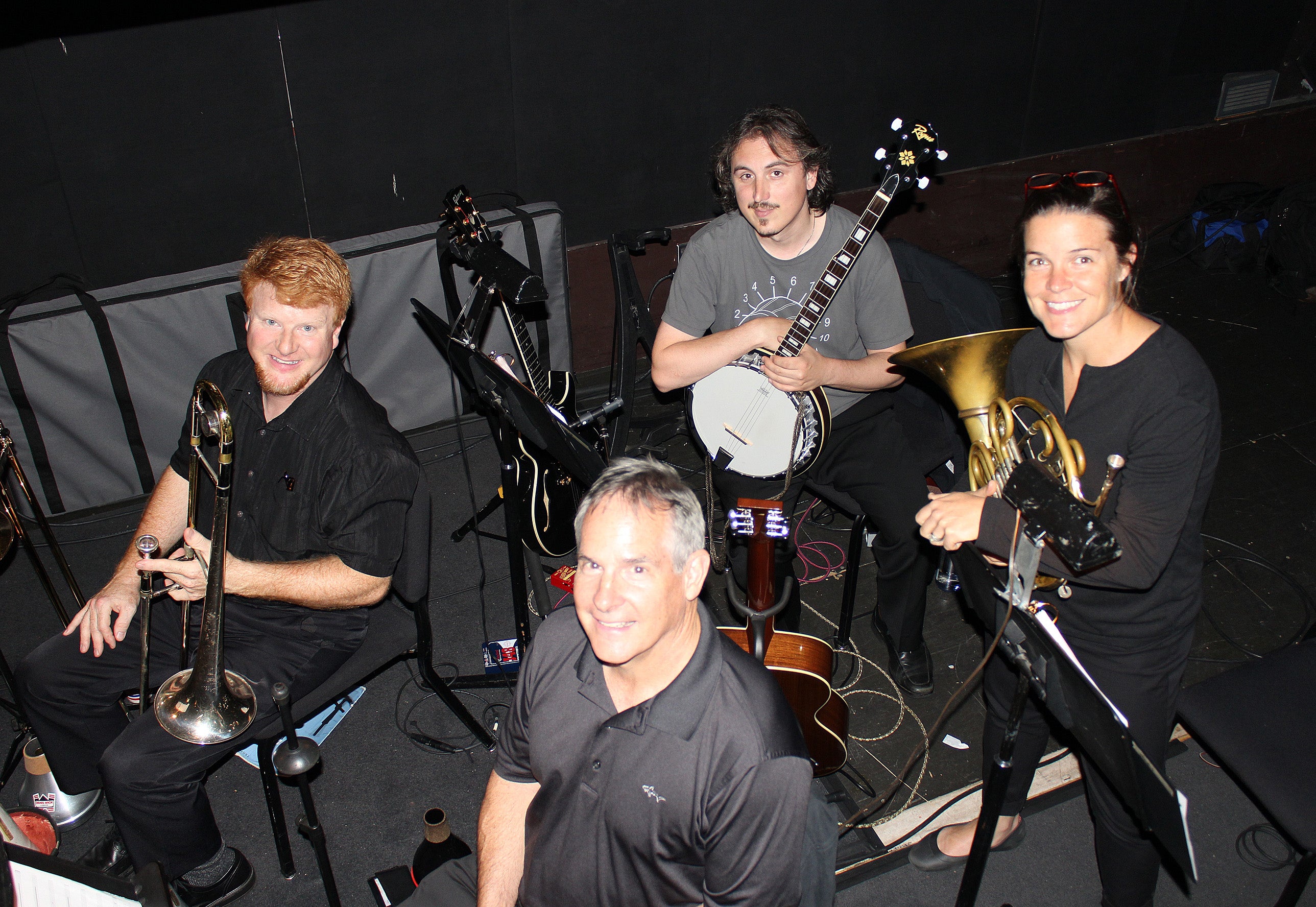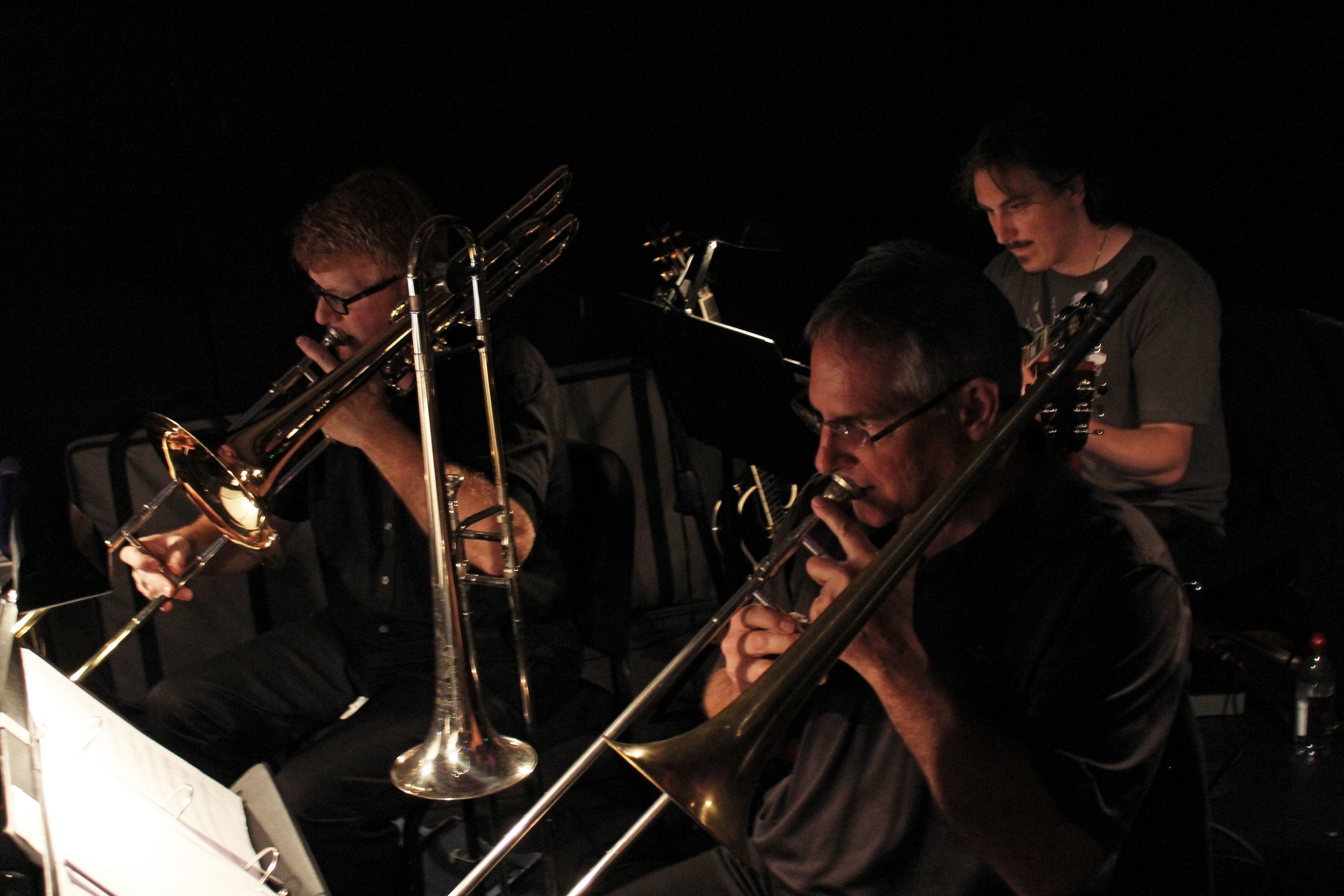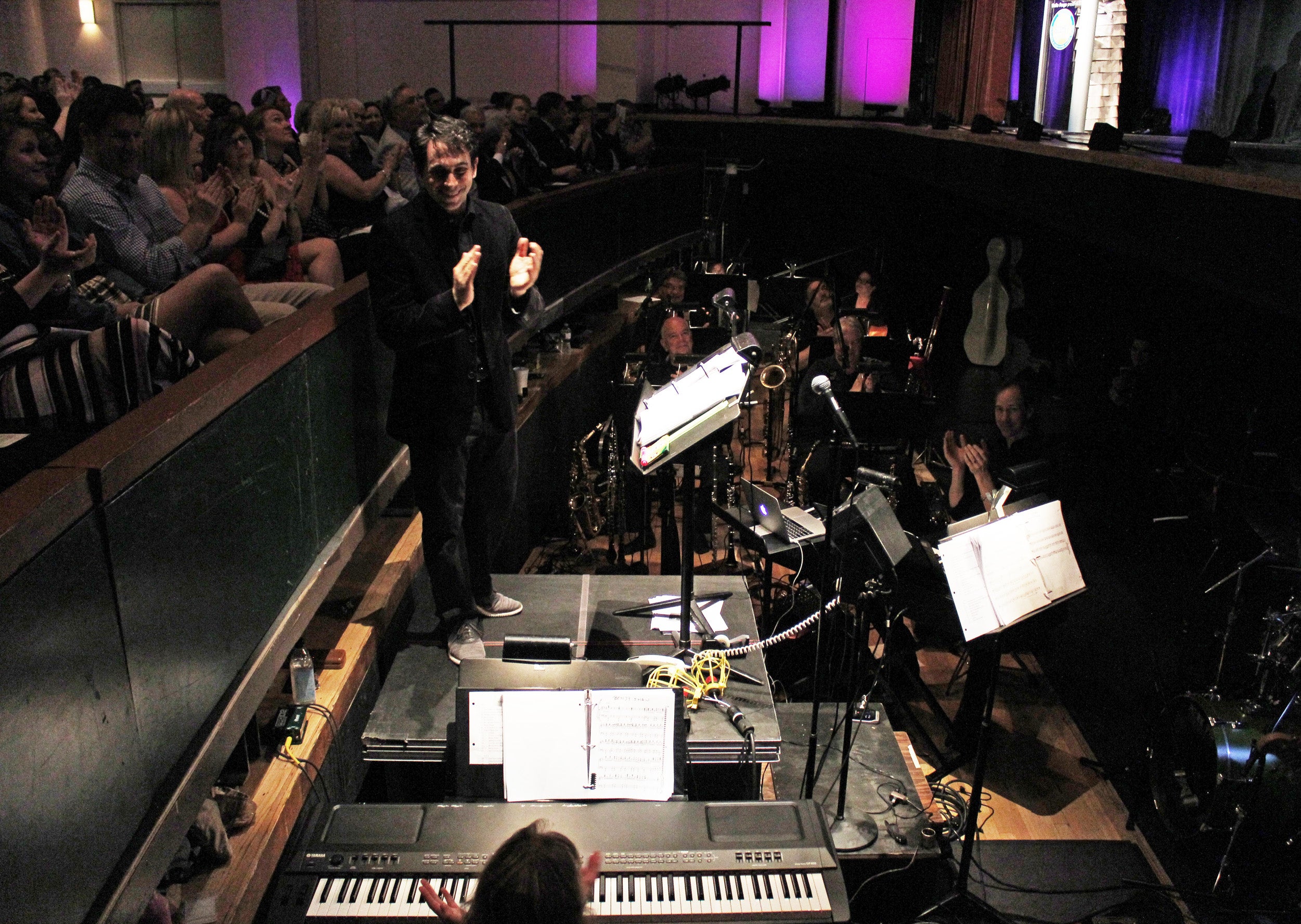
The View From the Pit: The Show Goes On Thanks to Local Musicians
Ever wondered about the musicians who play at Blumenthal’s shows? You’re not alone.
Audience members often lean over the pit after performances to ask musician Phil Thompson, questions about how the orchestra comes together for Blumenthal events. For the last 24 years, he has been helping Blumenthal hire local musicians for Broadway tours, concerts and other productions needing band members to supplement their show when they come through Charlotte.

It’s one of the many hats the professor emeritus (he recently retired from Winthrop University) and longtime performer with the Charlotte Symphony Orchestra has worn as a professional musician. An expert in multiple woodwind instruments, Thompson has been a stand out in the local music scene since coming to Charlotte in the late 1970s. He says the quality of musicianship in Charlotte has always been high, which makes his role easier as he pulls together a roster of musicians capable of expert performance despite very limited rehearsal time.
“There are musicians in town who are really second to none,” says Thompson. “I would put them up against any city in the country.”
A Little History
Thompson inherited his role as an independent musician’s contractor from renowned jazz pianist Loonis McGlohon (for whom McGlohon Theater is named). McGlohon, who had already attained national prominence as a composer, accompanist, and radio show host, was part of a core of talented musicians who regularly played gigs around town and accompanied any touring shows that came to Charlotte—even before Blumenthal Performing Arts opened its doors.
“These guys were staples of Charlotte and really did a lot for the early years,” says Thompson. “I’m blessed to sort of take on the baton from them.”
McGlohon, in particular, was a major influence and mentor for Thompson. “I played with Loonis all over the place. It was such a learning experience,” says Thompson. Unfortunately, around the time that Blumenthal Performing Arts opened its doors, McGlohon’s health began to fail. He asked Thompson to assist him with hiring musicians for a 1994 production of The Sound of Music and by 1998, as McGlohon continued to battle lymphoma,Thompson took over as the primary liaison between Blumenthal and local musicians.
A Numbers Game
Touring productions often depend on local musicians to fill out their orchestra on the road but the number of performers can range widely from a couple players to more than 30.
“It just depends on what the show calls for…. In New York there may be five woodwind players playing three instruments each. On the road it could be three musicians playing five instruments each.”
That’s right—many musicians will play multiple instruments during a single show. For the recent production of The Book of Mormon, Thompson played six different “horns.” (The most he has ever played were for West Side Story, calling for eight different woodwind instruments performed by the same musician!)
A core of musicians travel with any show. These include the Music Director, one of the keyboard players, and usually a drummer. Cost is a big factor in determining the size of an orchestra. So is the complexity of a score. If a touring Broadway show has a really difficult trumpet or violin book, for example, the producers may choose to travel with that particular musician too.
“Believe me this is not a problem in Charlotte but in some of the cities they go to there’s just not enough of a really good pool of musicians,” says Thompson. “They can’t afford to go into a smaller town and there’s a mediocre musician—it just ruins the show.”
Local musicians must be ready to jump in seamlessly despite little time to rehearse with the touring artists.
Selecting Musicians
Thompson doesn’t hold formal auditions but is keenly aware of available talent. “Charlotte is my home,” he says. “...I’ve been here over 40 years. When you’re part of an arts community like that, you kind of know everyone in town.
“I have a core of players who are absolutely the best around. These are ‘first call’ players. They’ve proven themselves and they are as good as anyone in the country.”
On any given night, there are multiple concerts, ensembles or shows happening around the city. That’s where a lot of networking among musicians takes place. Thompson says he’s slowed down his pace now that he has grandkids, but in his early days he would play five to seven nights a week. He still makes sure any new talent is on his radar.
“When there’s a new 23 year old trumpet player with the symphony, you better believe I’m listening to them,” Thompson says.
No Time to Waste
Things come together quickly when a show rolls into town. While local musicians receive their sheet music a week or more in advance to prepare their part, rehearsal time with the traveling artists is limited to a few hours. Most Broadway tours close on a Sunday in one theater and need to be ready to go by Tuesday evening in a totally different city.
Touring musicians typically arrive on Monday—their day off—and spend Tuesday morning at Belk Theater running the show with the local musicians. That evening, they do a one-hour sound check with the actors to ensure all the mics are working properly and possibly run through a page of music on the big numbers. That’s it. Then it’s show time.
“It calls for a very specialized player,” says Thompson. “They’ve got to have the intestinal fortitude to go through it one time and hit it… nail it. It’s fun. That’s what I love about it so much!
“People don’t realize it in the audience. They sound like they’ve been playing this music for three years.”
A Few of His Favorite Things
People always want to know what show is Thompson’s favorite to play. Until recently, he would have chosen West Side Story or Wicked (a score he has played hundreds of times). But things have changed.
“I can tell you right now since 2012, everyone’s favorite show hands down is the Blumey Awards,” says Thompson.
For that one night event, which highlights the extraordinary talents of area high school musical theater performers, 17 local professionals play in the pit. Most of the same musicians have come back year after year to play, under the baton of Broadway orchestrator David Dabbon. Several talented student musicians also get the chance to play with the orchestra or work as conductor’s assistants each spring—a unique opportunity for local teens.
(Blumey Awards Music Director David Dabbon prepares the orchestra for the 2018 awards ceremony)
“Tom [Gabbard] has put this city on the map as far as music [and] arts outside the symphony,” says Thompson.
Blumenthal’s commitment to ensuring the best sounding product on stage and providing Thompson with the flexibility and finances to hire excellent performers for each project are other factors he appreciates. “They are so supportive of local musicians,” he says. “They make my job so enjoyable and I’m not just blowing smoke. I’ve talked to the contractors in other cities.”
Looking Ahead
At least half the shows that come through town don’t need to hire local musicians at all. They are self-contained productions for budgetary reasons. On the low end, they typically use synthesizers to fill in the missing sounds or on the high end, they can afford to bring their own complete orchestra (as was the case with the national tour of Hamilton). Blumenthal has no control over that. But even as many traveling shows have scaled back over the years due to touring costs, Blumenthal continues to be the largest employer of local musicians, next to the symphony.
“We all say our prayers about this, that the shows don’t all go self-contained…” says Thompson. “If they do, the musicians will dry up. As long as the work continues and all of the shows don’t go self-contained, we’ll have a great pool of players in Charlotte and it will only get bigger.”

